How AI Simplifies Qualitative Market Research for Logistics
How AI Simplifies Qualitative Market Research for Logistics
How AI Simplifies Qualitative Market Research for Logistics



The logistics sector, known for its complexity and dynamic nature, presents unique challenges in qualitative market research. Traditional methods often fall short in capturing the multifaceted experiences of logistics professionals, leading to inefficient processes and suboptimal insights. AI-native survey builders are all set to redefine qualitative market research through innovative solutions customized to cater to the logistics industry.
This blogpost explores how AI simplifies the recruitment and engagement of research panels, addresses industry-specific challenges, and highlights future trends. Metaforms’ AI-native survey builder exemplifies these advancements, enhancing data quality and providing actionable insights that drive better decision-making in the logistics sector.
Qualitative Market Research Panel Recruitment in Logistics
Recruiting participants for qualitative market research in logistics differs significantly from other sectors. The logistics industry encompasses a wide range of roles, from drivers and warehouse workers to managers and IT specialists. This diversity necessitates a targeted recruitment approach to ensure comprehensive insights.
Step-by-Step Guide to Qualitative Research Panel Recruitment in Logistics
Define Objectives and Scope: Clearly outline what aspects of logistics operations you aim to study, whether it's supply chain efficiency, customer service, or technological adoption.
Identify Key Stakeholders: Determine which roles within the logistics chain are most relevant to your study. This could include frontline workers, management, and external partners.
Develop Screening Criteria: Create criteria to identify participants who have the relevant experience and insights. This ensures that the data collected is pertinent and valuable.
Leverage Industry Networks: Utilize professional associations, logistics forums, and industry events to reach potential participants. Partnering with logistics companies can also facilitate access to the right audience.
Design Engaging Recruitment Materials: Craft materials that speak to the specific experiences and challenges of logistics professionals. Highlight the importance of their contribution to improving industry standards.
Utilize AI Tools: Implement AI-driven platforms to streamline recruitment, manage participant data, and personalize outreach efforts.
Industry-Specific Challenges in Logistics Market Research
Conducting market research in the logistics sector comes with its own set of challenges:
Complex and Diverse Roles: The wide range of roles within logistics makes it difficult to gather a representative sample that covers all aspects of the industry.
High Turnover Rates: The logistics sector often experiences high turnover rates, which can impact the continuity and reliability of longitudinal studies.
Geographic Dispersion: Logistics operations are spread across vast geographic areas, complicating the logistics of conducting in-person interviews or focus groups.
Time Constraints: Logistics professionals often work long and irregular hours, making it challenging to schedule interviews and ensure active participation.
AI Tools to Tackle Logistics Market Research Challenges
AI-powered tools offer innovative solutions to overcome these challenges:
Automated Recruitment: AI-driven recruitment platforms can efficiently identify and reach potential participants, ensuring a diverse and representative panel.
Natural Language Processing (NLP): NLP helps design surveys that are easily understandable across different roles and experience levels within the logistics sector.
Predictive Analytics: AI models can predict participant engagement and identify the best times to reach out, optimizing response rates.
Virtual Focus Groups: AI facilitates virtual focus groups, allowing geographically dispersed participants to engage in meaningful discussions without the need for travel.
Data Validation: Machine learning algorithms ensure data quality by identifying and filtering out inconsistent or fraudulent responses in real-time.
Future Trends in AI-Powered Logistics Research
The future of AI in logistics market research is promising, with several emerging trends:
Real-Time Data Collection: AI tools will enable real-time data collection and analysis, providing instant insights that can inform immediate decision-making.
Enhanced Personalization: Surveys and interactions will become increasingly personalized, tailored to the specific experiences and preferences of individual participants.
Integration with IoT: The integration of AI with the Internet of Things (IoT) will provide richer data sources, offering a more comprehensive view of logistics operations.
Increased Accessibility: AI will enhance the accessibility of research tools, ensuring that participants from all levels and roles within the logistics sector can contribute their insights.
The Role of AI-Native Survey Builders
AI-native survey builders, like those offered by Metaforms, are at the forefront of this transformation. Here’s how they are making a difference:
Efficient Recruitment: AI streamlines the recruitment process, ensuring that the right participants are selected quickly and efficiently.
Enhanced Engagement: AI-driven surveys are more interactive and engaging, keeping participants motivated and attentive throughout the research process.
Superior Data Quality: Real-time data validation and fraud detection ensure that the insights gathered are reliable and actionable.
Actionable Insights: AI tools analyze vast amounts of qualitative data swiftly, providing researchers with deep and actionable insights that drive better decision-making.
Conclusion: AI Simplifies Qualitative Market Research for Logistics
In conclusion, AI-native survey builders are transforming qualitative market research in the logistics sector by addressing recruitment challenges, ensuring data quality, and enhancing participant engagement. Metaforms’ innovative AI-driven solutions empower researchers with efficient tools to gather accurate, valuable insights, driving better decision-making and fostering innovation. Embrace the future of qualitative market research with AI-powered solutions to unlock the full potential of data in the logistics industry.
The logistics sector, known for its complexity and dynamic nature, presents unique challenges in qualitative market research. Traditional methods often fall short in capturing the multifaceted experiences of logistics professionals, leading to inefficient processes and suboptimal insights. AI-native survey builders are all set to redefine qualitative market research through innovative solutions customized to cater to the logistics industry.
This blogpost explores how AI simplifies the recruitment and engagement of research panels, addresses industry-specific challenges, and highlights future trends. Metaforms’ AI-native survey builder exemplifies these advancements, enhancing data quality and providing actionable insights that drive better decision-making in the logistics sector.
Qualitative Market Research Panel Recruitment in Logistics
Recruiting participants for qualitative market research in logistics differs significantly from other sectors. The logistics industry encompasses a wide range of roles, from drivers and warehouse workers to managers and IT specialists. This diversity necessitates a targeted recruitment approach to ensure comprehensive insights.
Step-by-Step Guide to Qualitative Research Panel Recruitment in Logistics
Define Objectives and Scope: Clearly outline what aspects of logistics operations you aim to study, whether it's supply chain efficiency, customer service, or technological adoption.
Identify Key Stakeholders: Determine which roles within the logistics chain are most relevant to your study. This could include frontline workers, management, and external partners.
Develop Screening Criteria: Create criteria to identify participants who have the relevant experience and insights. This ensures that the data collected is pertinent and valuable.
Leverage Industry Networks: Utilize professional associations, logistics forums, and industry events to reach potential participants. Partnering with logistics companies can also facilitate access to the right audience.
Design Engaging Recruitment Materials: Craft materials that speak to the specific experiences and challenges of logistics professionals. Highlight the importance of their contribution to improving industry standards.
Utilize AI Tools: Implement AI-driven platforms to streamline recruitment, manage participant data, and personalize outreach efforts.
Industry-Specific Challenges in Logistics Market Research
Conducting market research in the logistics sector comes with its own set of challenges:
Complex and Diverse Roles: The wide range of roles within logistics makes it difficult to gather a representative sample that covers all aspects of the industry.
High Turnover Rates: The logistics sector often experiences high turnover rates, which can impact the continuity and reliability of longitudinal studies.
Geographic Dispersion: Logistics operations are spread across vast geographic areas, complicating the logistics of conducting in-person interviews or focus groups.
Time Constraints: Logistics professionals often work long and irregular hours, making it challenging to schedule interviews and ensure active participation.
AI Tools to Tackle Logistics Market Research Challenges
AI-powered tools offer innovative solutions to overcome these challenges:
Automated Recruitment: AI-driven recruitment platforms can efficiently identify and reach potential participants, ensuring a diverse and representative panel.
Natural Language Processing (NLP): NLP helps design surveys that are easily understandable across different roles and experience levels within the logistics sector.
Predictive Analytics: AI models can predict participant engagement and identify the best times to reach out, optimizing response rates.
Virtual Focus Groups: AI facilitates virtual focus groups, allowing geographically dispersed participants to engage in meaningful discussions without the need for travel.
Data Validation: Machine learning algorithms ensure data quality by identifying and filtering out inconsistent or fraudulent responses in real-time.
Future Trends in AI-Powered Logistics Research
The future of AI in logistics market research is promising, with several emerging trends:
Real-Time Data Collection: AI tools will enable real-time data collection and analysis, providing instant insights that can inform immediate decision-making.
Enhanced Personalization: Surveys and interactions will become increasingly personalized, tailored to the specific experiences and preferences of individual participants.
Integration with IoT: The integration of AI with the Internet of Things (IoT) will provide richer data sources, offering a more comprehensive view of logistics operations.
Increased Accessibility: AI will enhance the accessibility of research tools, ensuring that participants from all levels and roles within the logistics sector can contribute their insights.
The Role of AI-Native Survey Builders
AI-native survey builders, like those offered by Metaforms, are at the forefront of this transformation. Here’s how they are making a difference:
Efficient Recruitment: AI streamlines the recruitment process, ensuring that the right participants are selected quickly and efficiently.
Enhanced Engagement: AI-driven surveys are more interactive and engaging, keeping participants motivated and attentive throughout the research process.
Superior Data Quality: Real-time data validation and fraud detection ensure that the insights gathered are reliable and actionable.
Actionable Insights: AI tools analyze vast amounts of qualitative data swiftly, providing researchers with deep and actionable insights that drive better decision-making.
Conclusion: AI Simplifies Qualitative Market Research for Logistics
In conclusion, AI-native survey builders are transforming qualitative market research in the logistics sector by addressing recruitment challenges, ensuring data quality, and enhancing participant engagement. Metaforms’ innovative AI-driven solutions empower researchers with efficient tools to gather accurate, valuable insights, driving better decision-making and fostering innovation. Embrace the future of qualitative market research with AI-powered solutions to unlock the full potential of data in the logistics industry.
The logistics sector, known for its complexity and dynamic nature, presents unique challenges in qualitative market research. Traditional methods often fall short in capturing the multifaceted experiences of logistics professionals, leading to inefficient processes and suboptimal insights. AI-native survey builders are all set to redefine qualitative market research through innovative solutions customized to cater to the logistics industry.
This blogpost explores how AI simplifies the recruitment and engagement of research panels, addresses industry-specific challenges, and highlights future trends. Metaforms’ AI-native survey builder exemplifies these advancements, enhancing data quality and providing actionable insights that drive better decision-making in the logistics sector.
Qualitative Market Research Panel Recruitment in Logistics
Recruiting participants for qualitative market research in logistics differs significantly from other sectors. The logistics industry encompasses a wide range of roles, from drivers and warehouse workers to managers and IT specialists. This diversity necessitates a targeted recruitment approach to ensure comprehensive insights.
Step-by-Step Guide to Qualitative Research Panel Recruitment in Logistics
Define Objectives and Scope: Clearly outline what aspects of logistics operations you aim to study, whether it's supply chain efficiency, customer service, or technological adoption.
Identify Key Stakeholders: Determine which roles within the logistics chain are most relevant to your study. This could include frontline workers, management, and external partners.
Develop Screening Criteria: Create criteria to identify participants who have the relevant experience and insights. This ensures that the data collected is pertinent and valuable.
Leverage Industry Networks: Utilize professional associations, logistics forums, and industry events to reach potential participants. Partnering with logistics companies can also facilitate access to the right audience.
Design Engaging Recruitment Materials: Craft materials that speak to the specific experiences and challenges of logistics professionals. Highlight the importance of their contribution to improving industry standards.
Utilize AI Tools: Implement AI-driven platforms to streamline recruitment, manage participant data, and personalize outreach efforts.
Industry-Specific Challenges in Logistics Market Research
Conducting market research in the logistics sector comes with its own set of challenges:
Complex and Diverse Roles: The wide range of roles within logistics makes it difficult to gather a representative sample that covers all aspects of the industry.
High Turnover Rates: The logistics sector often experiences high turnover rates, which can impact the continuity and reliability of longitudinal studies.
Geographic Dispersion: Logistics operations are spread across vast geographic areas, complicating the logistics of conducting in-person interviews or focus groups.
Time Constraints: Logistics professionals often work long and irregular hours, making it challenging to schedule interviews and ensure active participation.
AI Tools to Tackle Logistics Market Research Challenges
AI-powered tools offer innovative solutions to overcome these challenges:
Automated Recruitment: AI-driven recruitment platforms can efficiently identify and reach potential participants, ensuring a diverse and representative panel.
Natural Language Processing (NLP): NLP helps design surveys that are easily understandable across different roles and experience levels within the logistics sector.
Predictive Analytics: AI models can predict participant engagement and identify the best times to reach out, optimizing response rates.
Virtual Focus Groups: AI facilitates virtual focus groups, allowing geographically dispersed participants to engage in meaningful discussions without the need for travel.
Data Validation: Machine learning algorithms ensure data quality by identifying and filtering out inconsistent or fraudulent responses in real-time.
Future Trends in AI-Powered Logistics Research
The future of AI in logistics market research is promising, with several emerging trends:
Real-Time Data Collection: AI tools will enable real-time data collection and analysis, providing instant insights that can inform immediate decision-making.
Enhanced Personalization: Surveys and interactions will become increasingly personalized, tailored to the specific experiences and preferences of individual participants.
Integration with IoT: The integration of AI with the Internet of Things (IoT) will provide richer data sources, offering a more comprehensive view of logistics operations.
Increased Accessibility: AI will enhance the accessibility of research tools, ensuring that participants from all levels and roles within the logistics sector can contribute their insights.
The Role of AI-Native Survey Builders
AI-native survey builders, like those offered by Metaforms, are at the forefront of this transformation. Here’s how they are making a difference:
Efficient Recruitment: AI streamlines the recruitment process, ensuring that the right participants are selected quickly and efficiently.
Enhanced Engagement: AI-driven surveys are more interactive and engaging, keeping participants motivated and attentive throughout the research process.
Superior Data Quality: Real-time data validation and fraud detection ensure that the insights gathered are reliable and actionable.
Actionable Insights: AI tools analyze vast amounts of qualitative data swiftly, providing researchers with deep and actionable insights that drive better decision-making.
Conclusion: AI Simplifies Qualitative Market Research for Logistics
In conclusion, AI-native survey builders are transforming qualitative market research in the logistics sector by addressing recruitment challenges, ensuring data quality, and enhancing participant engagement. Metaforms’ innovative AI-driven solutions empower researchers with efficient tools to gather accurate, valuable insights, driving better decision-making and fostering innovation. Embrace the future of qualitative market research with AI-powered solutions to unlock the full potential of data in the logistics industry.

Nine Types of Healthcare and Medical Forms.
Medical forms are a must-have for any healthcare business or practitioner. Learn about the different kinds of medical and healthcare forms.
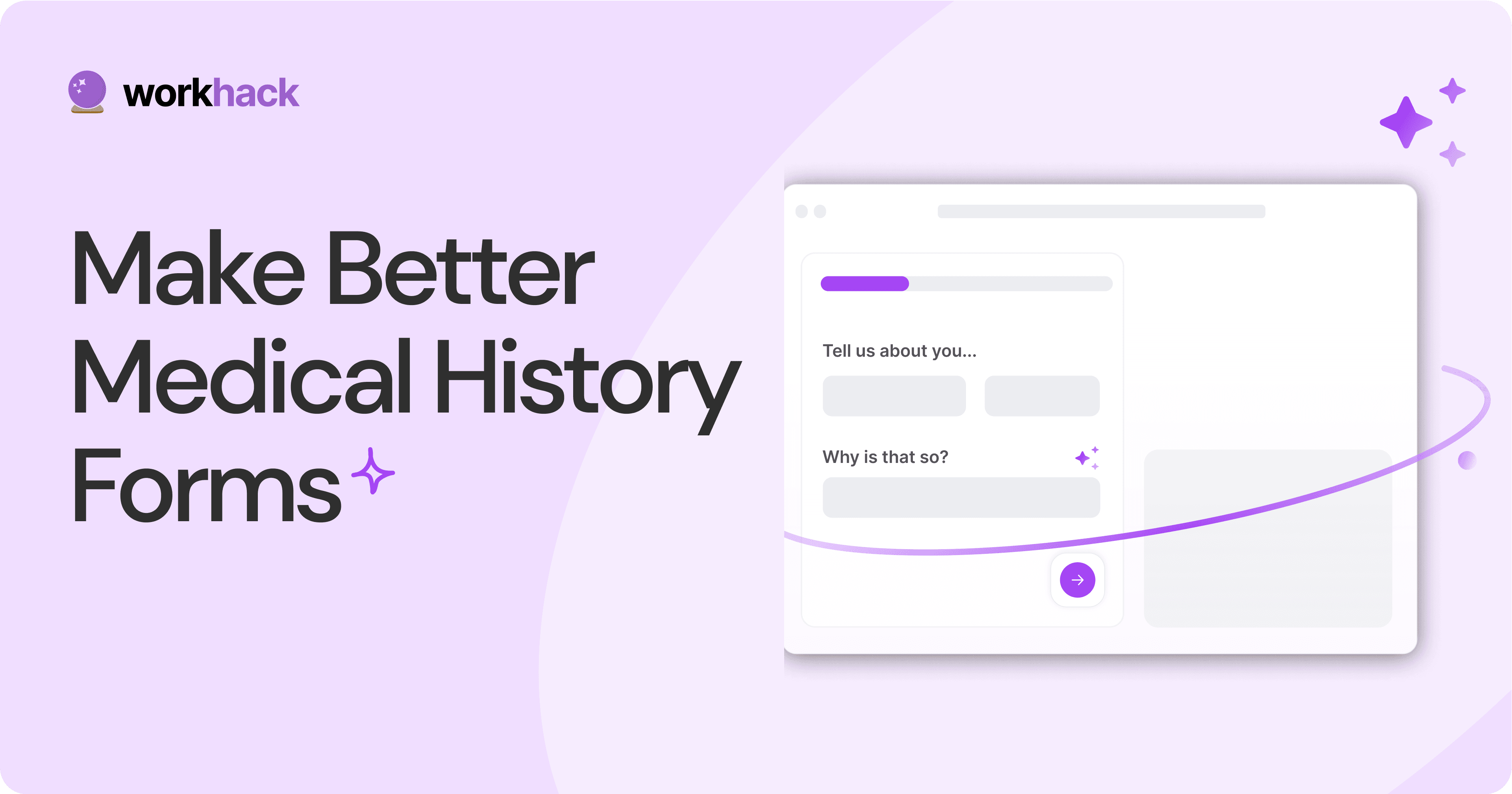
4 Tips for Better Medical History Forms.
Medical history forms are central to patient care, onboarding, and medical administration records. Learn how to make them easier to fill.
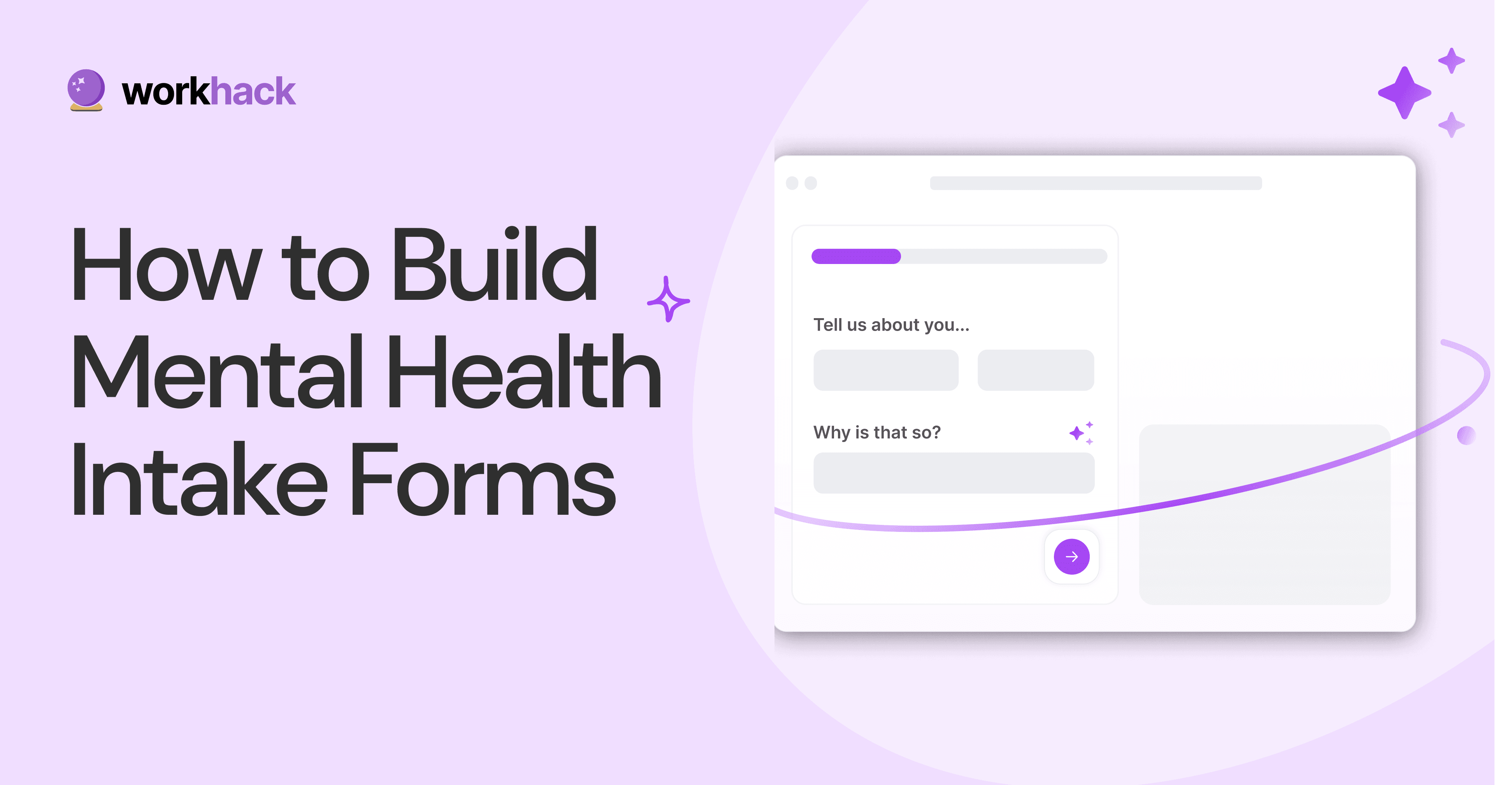
How to Build Mental Health Intake Forms?
Mental health intake forms are not like patient intake forms. Mental health intake forms deal with far more sensitive data and have specific design methods.
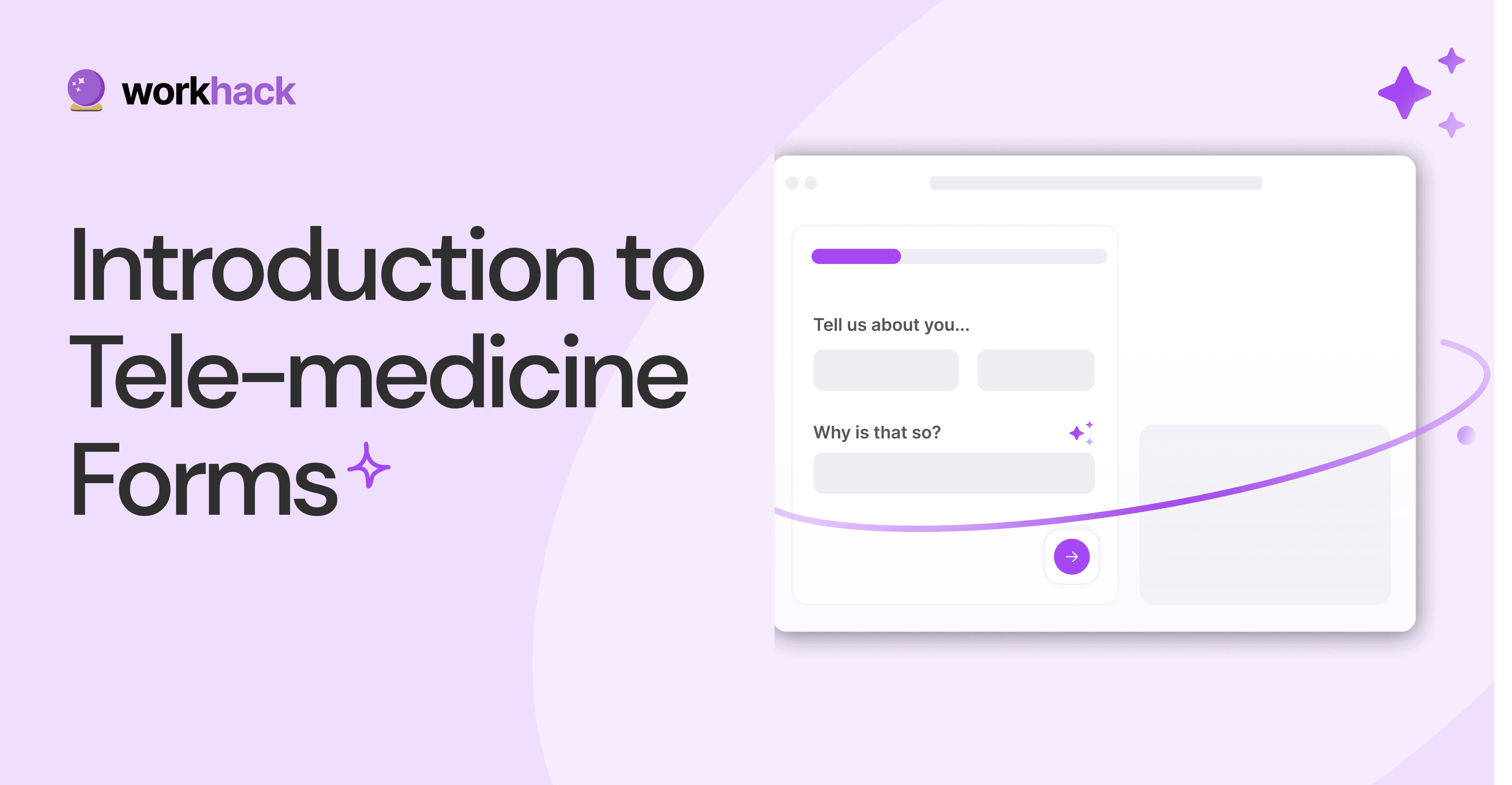
What, Why and How of Telemedicine Forms.
Telemedicine is on the rise and with different form builders out there, which one best suits your needs as a healthcare services provider?
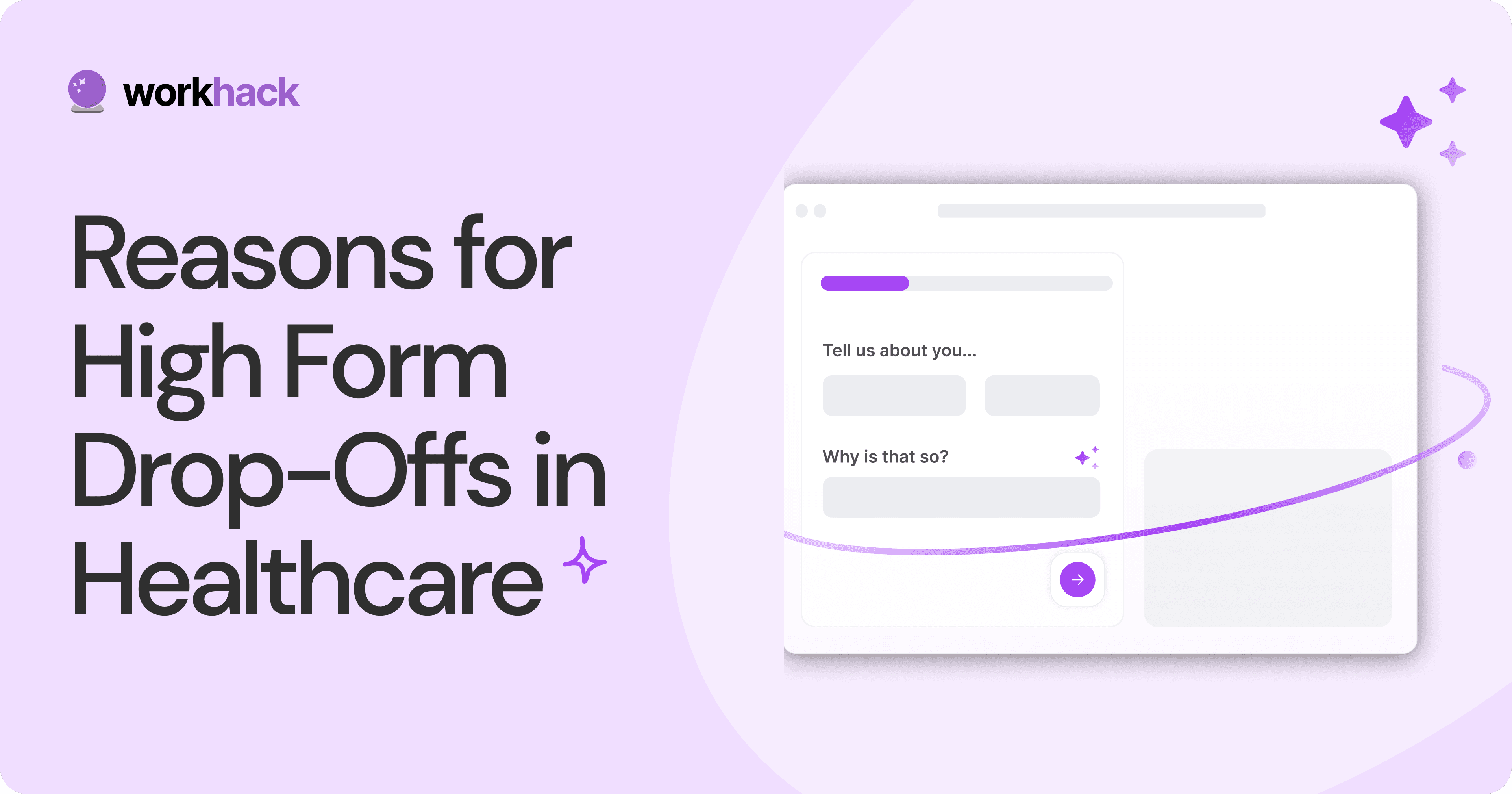
3 Reasons for Major Drop-Offs in Medical Forms.
No matter which healthcare form we pick, there are major drop-off reasons. We shall dive into the top 3 and learn how to resolve them in your next form.
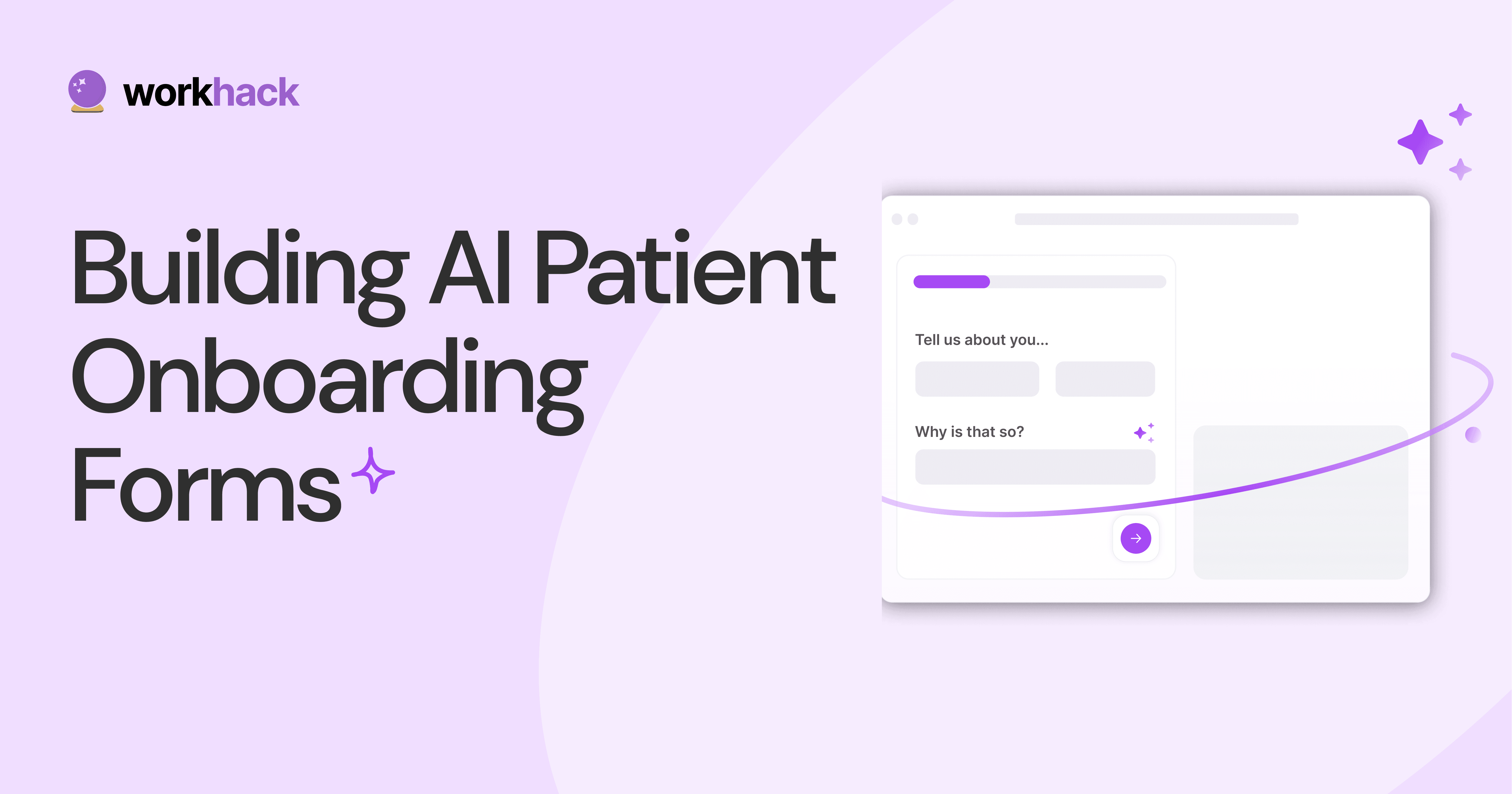
Patient Onboarding Forms - From Click to Clinic.
Patient onboarding forms are the first touchpoint for patients; getting this right for higher conversion rates is a must-have. Learn how to perfect them now.

5 Key Parts of a Good Patient Satisfaction Form.
The goal of patient satisfaction surveys is to course-correct the services of a healthcare provider. Patient feedback leads to a culture of patient-centric care.
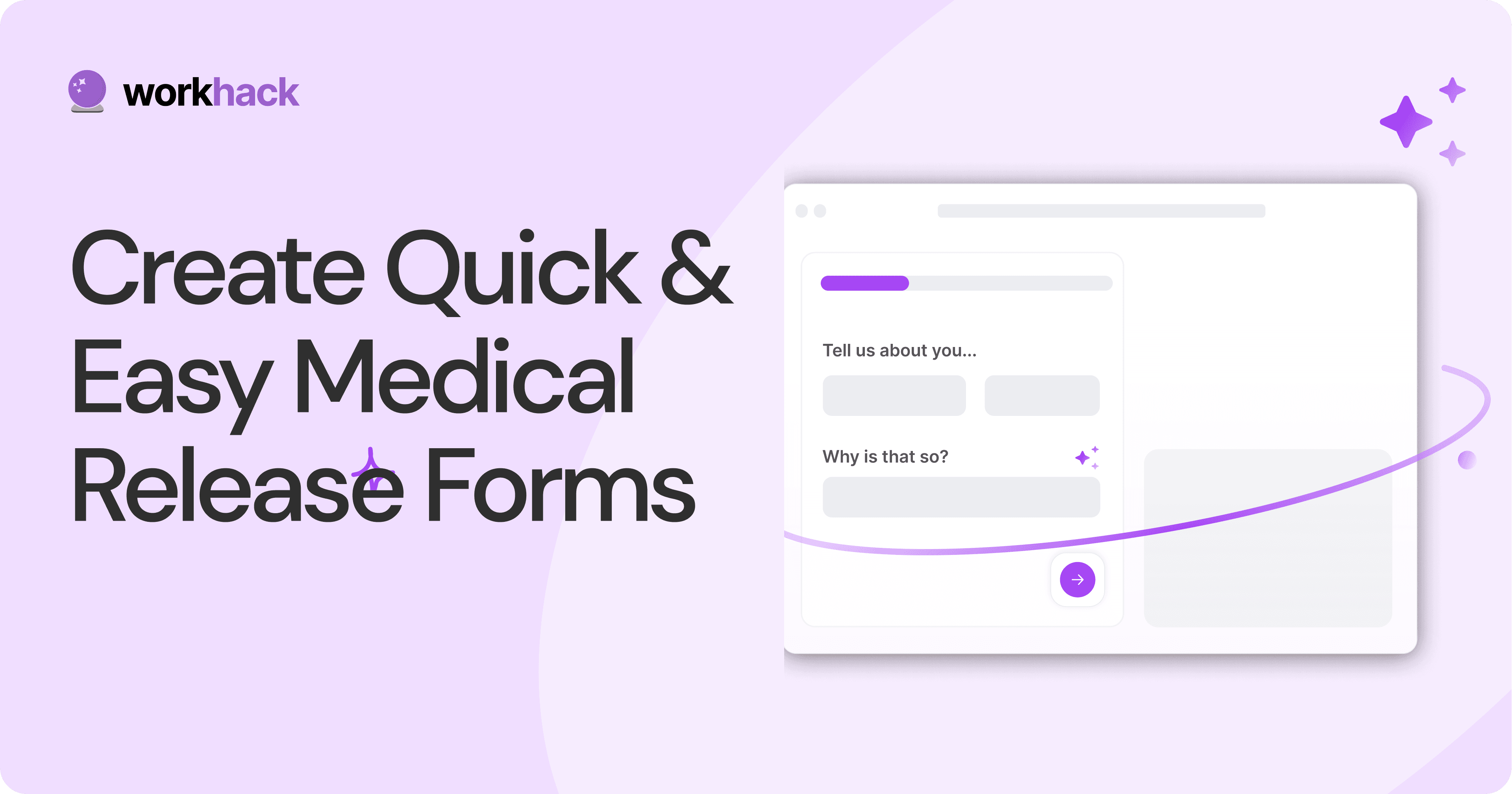
Build Quick and Easy Medical Release Forms.
Every HIPAA-compliant healthcare provider comes across medical release forms that involve details from medical history forms. Can they be shipped fast? Yes.

Nine Types of Healthcare and Medical Forms.
Medical forms are a must-have for any healthcare business or practitioner. Learn about the different kinds of medical and healthcare forms.

4 Tips for Better Medical History Forms.
Medical history forms are central to patient care, onboarding, and medical administration records. Learn how to make them easier to fill.

How to Build Mental Health Intake Forms?
Mental health intake forms are not like patient intake forms. Mental health intake forms deal with far more sensitive data and have specific design methods.

What, Why and How of Telemedicine Forms.
Telemedicine is on the rise and with different form builders out there, which one best suits your needs as a healthcare services provider?

3 Reasons for Major Drop-Offs in Medical Forms.
No matter which healthcare form we pick, there are major drop-off reasons. We shall dive into the top 3 and learn how to resolve them in your next form.

Patient Onboarding Forms - From Click to Clinic.
Patient onboarding forms are the first touchpoint for patients; getting this right for higher conversion rates is a must-have. Learn how to perfect them now.

5 Key Parts of a Good Patient Satisfaction Form.
The goal of patient satisfaction surveys is to course-correct the services of a healthcare provider. Patient feedback leads to a culture of patient-centric care.

Build Quick and Easy Medical Release Forms.
Every HIPAA-compliant healthcare provider comes across medical release forms that involve details from medical history forms. Can they be shipped fast? Yes.

Nine Types of Healthcare and Medical Forms.
Medical forms are a must-have for any healthcare business or practitioner. Learn about the different kinds of medical and healthcare forms.

4 Tips for Better Medical History Forms.
Medical history forms are central to patient care, onboarding, and medical administration records. Learn how to make them easier to fill.

How to Build Mental Health Intake Forms?
Mental health intake forms are not like patient intake forms. Mental health intake forms deal with far more sensitive data and have specific design methods.

What, Why and How of Telemedicine Forms.
Telemedicine is on the rise and with different form builders out there, which one best suits your needs as a healthcare services provider?

3 Reasons for Major Drop-Offs in Medical Forms.
No matter which healthcare form we pick, there are major drop-off reasons. We shall dive into the top 3 and learn how to resolve them in your next form.

Patient Onboarding Forms - From Click to Clinic.
Patient onboarding forms are the first touchpoint for patients; getting this right for higher conversion rates is a must-have. Learn how to perfect them now.

5 Key Parts of a Good Patient Satisfaction Form.
The goal of patient satisfaction surveys is to course-correct the services of a healthcare provider. Patient feedback leads to a culture of patient-centric care.

Build Quick and Easy Medical Release Forms.
Every HIPAA-compliant healthcare provider comes across medical release forms that involve details from medical history forms. Can they be shipped fast? Yes.

Nine Types of Healthcare and Medical Forms.
Medical forms are a must-have for any healthcare business or practitioner. Learn about the different kinds of medical and healthcare forms.

4 Tips for Better Medical History Forms.
Medical history forms are central to patient care, onboarding, and medical administration records. Learn how to make them easier to fill.

How to Build Mental Health Intake Forms?
Mental health intake forms are not like patient intake forms. Mental health intake forms deal with far more sensitive data and have specific design methods.

What, Why and How of Telemedicine Forms.
Telemedicine is on the rise and with different form builders out there, which one best suits your needs as a healthcare services provider?

3 Reasons for Major Drop-Offs in Medical Forms.
No matter which healthcare form we pick, there are major drop-off reasons. We shall dive into the top 3 and learn how to resolve them in your next form.

Patient Onboarding Forms - From Click to Clinic.
Patient onboarding forms are the first touchpoint for patients; getting this right for higher conversion rates is a must-have. Learn how to perfect them now.

5 Key Parts of a Good Patient Satisfaction Form.
The goal of patient satisfaction surveys is to course-correct the services of a healthcare provider. Patient feedback leads to a culture of patient-centric care.

Build Quick and Easy Medical Release Forms.
Every HIPAA-compliant healthcare provider comes across medical release forms that involve details from medical history forms. Can they be shipped fast? Yes.
Subscribe to stay updated.
Subscribe to stay updated.
Subscribe to stay updated.
HC

HC

HC

HC

70+ people from across industries read our emails.
HC

HC

70+ people from across industries read our emails.
HC

HC

HC

70+ people from across industries read our emails.




Bangalore, India / San Francisco, US
WorkHack Inc. 2023
Bangalore, India
San Francisco, US
WorkHack Inc. 2023
WorkHack Inc. 2023
Bangalore, India / San Francisco, US
WorkHack Inc. 2023
Bangalore, India / San Francisco, US



